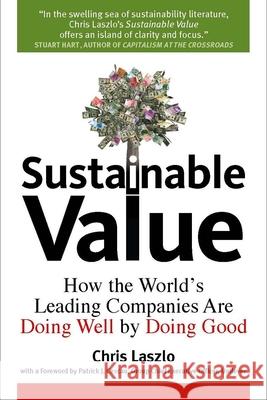Sustainable Value: How the World's Leading Companies Are Doing Well by Doing Good » książka
Sustainable Value: How the World's Leading Companies Are Doing Well by Doing Good
ISBN-13: 9780804759632 / Angielski / Twarda / 2008 / 208 str.
Sustainable Value: How the World's Leading Companies Are Doing Well by Doing Good
ISBN-13: 9780804759632 / Angielski / Twarda / 2008 / 208 str.
(netto: 196,35 VAT: 5%)
Najniższa cena z 30 dni: 206,17
ok. 16-18 dni roboczych.
Darmowa dostawa!
In Sustainable Value, Chris Laszlo illustrates how the competitive strategies of some of the world's largest businesses are changing as their leaders begin to take on a number of the world's most important social, environmental, and economic issues. Part I of the book is a management fable about a young CEO and the challenges she faces in addressing her company's impact on society and the environment, while remaining profitable. Based on forward-thinking business leaders the author has worked with over the past twenty-five years, her character reveals how a small but influential group of leaders are re-inventing the role of business in society by offering new solutions to global problems that the public sector has been unable to tackle alone. Part II outlines the new competitive environment in which societal challenges are becoming huge business opportunities. It showcases global industry leaders who are successfully integrating sustainability into their core activities as they respond to issues such as climate change, ecosystem health, and global poverty--not only from a sense of moral correctness, but because it makes good business sense. It demonstrates that, in the "new" competitive environment, stakeholder value built on a company's economic, ecological, and social impact is becoming an effective way to achieve competitive advantage. The real-life sustainability stories of DuPont, Wal-Mart, Lafarge, and Cargills NatureWorks are guided by top management with Profit & Loss responsibility. Part III introduces the Sustainable Value tool-kit--a step-by-step approach to creating and managing value for stakeholders in a broad range of sectors in today's shifting competitive environment. The tool-kit is based on the authors many consulting engagements and executive working sessions in Fortune 1000 companies. These sessions, and this book, are designed to equip managers with the skills to identify how and where they can do well by doing good, thus providing them with the means to build sustainable value and compete effectively in the twenty-first century.











